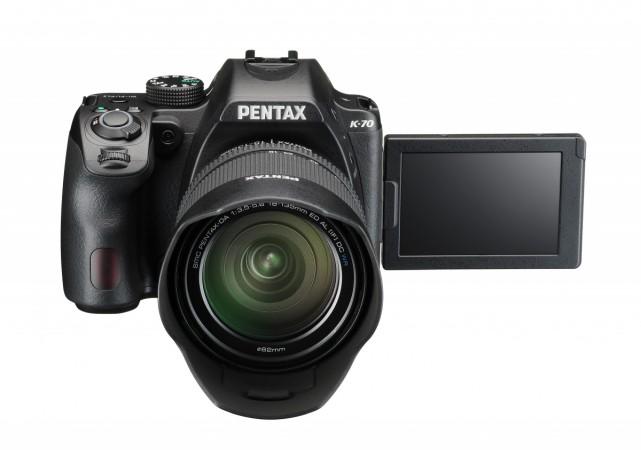
Pentax announced the K-70 a month ago and now the mid-range DSLR is expected to ship starting July 22. While the camera, at first glance, has the features common among mid-range DSLRs, such as the Nikon D5500 and the Canon 750D, some aspects in the Pentax K-70 are so advanced that even those like the Nikon D7200 and the Canon 80D do not have them.
How does the K-70 match up to these pro-sumer DSLRs?
Running through the Pentax K-70's specs, the DSLR camera features a 24 MP APS-C sensor, something the Nikon D7200, the Nikon D5500, the Canon 80D and the Canon 750D possess. Another interesting feature the Pentax K-70 features is a fully articulating screen, something that's become a bit of a mainstay in the mid-range DSLR category. While the Nikon D5500, the Canon 750D and the Canon 80D feature a tilty-flippy LCD screen, it's only the Nikon D7200 that doesn't feature this type of screen.
Pentax's mid-range DSLR camera, the K-70, also features something that's uncharacteristic of mid-range DSLRs â€" it features a pentaprism instead of a pentamirror in front of the viewfinder. A pentaprism is better than a pentamirror because it allows more light to come in, making focusing in low light easier. The trade-off is that pentamirrors are cheaper to produce than pentaprisms. Pentaprisms also last longer as they are cut from a solid chunk of glass, as opposed to being housed in an empty chamber. Pentamirrors, because of this, could end up gathering dust or moisture, which becomes a permanent annoyance.
By virtue of having a pentaprism, the Pentax K-70, gives users 100 percent viewfinder coverage, much like the Nikon D7200 and the Canon 80D, whereas the D5500 and the 750D have a 95 percent viewfinder coverage, which makes accurate framing a bit difficult.
When it comes to ISO sensitivity, the Pentax K-70's sensitivity ranges between ISO 100 and ISO 1,02,400. In contrast, the Nikon D7200 tops off at ISO 25,600 and goes up to ISO 1,02,400 only in boost mode. The Canon 80D's ISO range is between 100-16,000 (25,600 in boost mode); the Nikon D5500's lies between ISO 100 â€" 25600 and the Canon 750D's is between ISO 100-12800 (expandable to ISO 25600).
Not only is the Pentax built for speed from an image sensitivity point of view, its shutter is also built for speed. It can fire at up 1/6000 of a second, just below the Nikon D7200 and the Canon 80D's 1/8000 of a second and higher than the Nikon D5500 and the Canon 750D's 1/4000 of a second. In continuous shooting mode, the Pentax K-70 can fire away at up to 6 frames a second (fps), which is short of the Canon 80D's 7 fps and equal to the Nikon D7200, however, the Pentax K-70 fires away faster than the Nikon D5500 and the Canon 750D's 5 fps.
The only aspect where the Pentax K-70 really lags behind the rest of the competition is with regard to the number of AF points. The Pentax K-70 features a paltry 11-AF points, something Nikon featured in the D90 launched in 2008. Currently, the Nikon D7200 features 51 AF points, the Canon 80D has 45, the D5500 has 39 and the 750D features 19 AF points, but where the Pentax K-70 scores over its rivals is in its all-round weather sealing, something that's common in the likes of the Nikon D5, the Canon 1DX Mark II and Pentax's own full-frame camera, the K-1.
Interestingly, the Pentax K-70 is also the cheapest DSLR camera among its rivals. For just the body, the Pentax K-70 costs $649 (Rs. 43,500 approx), while the Nikon D7200, the Canon 80D, the Nikon D5500 and the Canon 750D cost $1199 (Rs. 80,000 approx), $1199 ( Rs. 80,000 approx), $899 (Rs. 60,000 approx) and $749 (Rs. 50,000 approx), respectively.
Looking at the Pentax K-70's specs and features, we can't help but ask a pertinent question â€" is Pentax trying to take on the Nikon D7200 and the Canon 80D while positioning itself as a competitor to the D5500 and the 750D? Or is it giving potential buyers for both cameras a solid option that sits in-between when it comes to specs, but gives better value for money?

















